
The Soviet Union (USSR) competed at the 1976 Summer Olympics in the city of Montreal, Quebec, Canada. 410 competitors, 285 men and 125 women, took part in 189 events in 22 sports. As the country hosted the next Olympics in Moscow, a Soviet segment was performed at the closing ceremony.
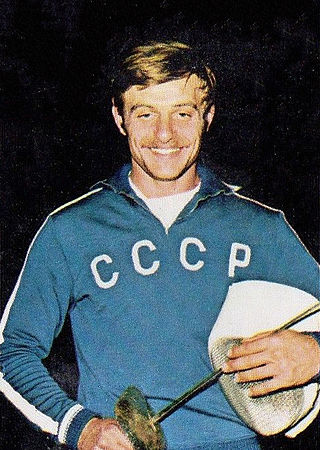
Viktor Alexandrovich Sidyak is a Russian former left-handed sabre fencer, a pupil of Mark Rakita and David Tyshler. He was known for his aggressive style and the "one-and-a-half tempo attack".

The men's sabre was one of eight fencing events on the fencing at the 1964 Summer Olympics programme. It was the fifteenth appearance of the event. The competition was held from October 19 to 20, 1964. 52 fencers from 21 nations competed. Nations had been limited to three fencers each since 1928. The event was won by Tibor Pézsa, the final of nine straight Games in which a Hungarian fencer won the event. The silver medal went to Claude Arabo of France, with Umyar Mavlikhanov of the Soviet Union taking bronze.
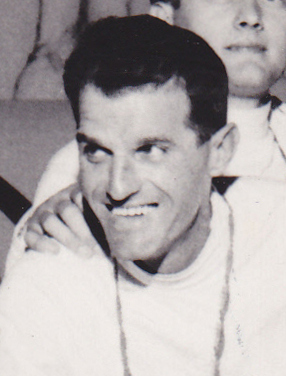
The men's sabre was one of seven fencing events on the fencing at the 1956 Summer Olympics programme. It was the thirteenth appearance of the event. The competition was held on 5 December 1956. 35 fencers from 17 nations competed. Nations had been limited to three fencers each since 1928. The event was won by Rudolf Kárpáti, the seventh of nine straight Games in which a Hungarian would win the event. Jerzy Pawłowski of Poland took silver and Lev Kuznetsov of the Soviet Union took bronze, the first medals in the event for each nation and the first time since 1924 that any nation other than Hungary and Italy earned a medal in the men's sabre.

The men's sabre was one of eight fencing events on the fencing at the 1960 Summer Olympics programme. It was the fourteenth appearance of the event. The competition was held from 7 to 8 September 1960. 70 fencers from 29 nations competed. Nations had been limited to three fencers each since 1928. The event was won by Rudolf Kárpáti, the eighth of nine straight Games in which a Hungarian would win the event. Kárpáti was the second man to successfully defend an Olympic title in the men's sabre and fifth to win multiple medals of any color. His teammate Zoltán Horváth took silver while Wladimiro Calarese of Italy finished with the bronze.

The men's épée was one of eight fencing events on the fencing at the 1968 Summer Olympics programme. It was the fifteenth appearance of the event. The competition was held from 21 to 22 October 1968. 72 fencers from 28 nations competed. Each nation was limited to three fencers. The event was won by Győző Kulcsár of Hungary, the nation's first medal in the men's individual épée. Defending gold medalist Grigory Kriss of the Soviet Union took silver, becoming the eighth man to win multiple medals in the event and extending the Soviet podium streak to three Games. Italy returned to the podium as well after a one-Games absence broke its six-Games gold medal streak, with Gianluigi Saccaro earning bronze.
The men's foil was one of eight fencing events on the fencing at the 1968 Summer Olympics programme. It was the fifteenth appearance of the event. The competition was held from 15 to 16 October 1968. 64 fencers from 25 nations competed. Nations had been limited to three fencers each since 1928. The event was won by Ion Drîmbă of Romania, the nation's first medal in the men's foil. Silver went to Jenő Kamuti, the first medal for Hungary in the event since 1948. Daniel Revenu of France repeated as the bronze medalist, the sixth man to win multiple medals in the event.
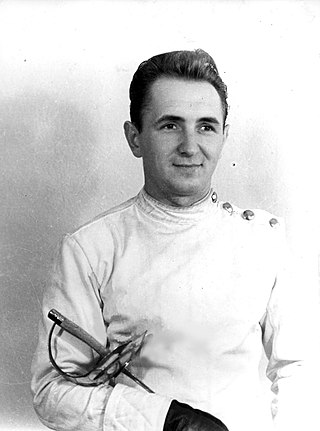
The men's sabre was one of eight fencing events on the fencing at the 1968 Summer Olympics programme. It was the sixteenth appearance of the event. The competition was held from 16 to 17 October 1968. 40 fencers from 16 nations competed. Nations had been limited to three fencers each since 1928. The event was won by Jerzy Pawłowski of Poland, breaking a nine-Games string of Hungarian victories in the event. Hungary's best result in the event was Tibor Pézsa's bronze; Pézsa beat Pawłowski in the final pool but the Hungarian lost two other bouts while the Pole was otherwise flawless. Mark Rakita of the Soviet Union lost only to Pawłowski in the final pool, forcing another bout to break the tie between them for gold and silver; that barrage bout was decided by a single point as Pawłowski beat Rakita 5–4.
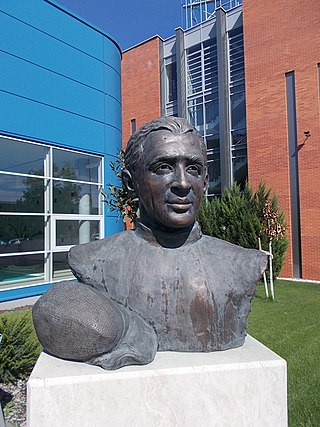
The men's épée was one of eight fencing events on the fencing at the 1972 Summer Olympics programme. It was the sixteenth appearance of the event. The competition was held from 4 to 6 September 1972. 71 fencers from 28 nations competed. Each nation was limited to three fencers. The event was won by Csaba Fenyvesi of Hungary, the nation's second consecutive victory in the event. His countryman Győző Kulcsár, the 1968 gold medalist, earned bronze this time to become the ninth man to win multiple medals in the men's individual épée. Silver went to Jacques Ladègaillerie of France; the French épéeists, a power in the event from 1900 to 1932, earned their first individual medal in 40 years. The three-Games podium streak of the Soviet Union was snapped, with all three Soviet fencers reaching the semifinals but eliminated there.

The men's sabre was one of eight fencing events on the fencing at the 1972 Summer Olympics programme. It was the seventeenth appearance of the event. The competition was held from 30 to 31 August 1972. 53 fencers from 22 nations competed. Nations had been limited to three fencers each since 1928. The event was won by Viktor Sidyak of the Soviet Union, the nation's first victory in the event. Hungary had lost its nine-Games gold medal streak in 1968 but remained a power in the event; Péter Marót took silver to extend Hungary's podium streak to 11 Games. Another Soviet, Vladimir Nazlymov, earned bronze.

The men's épée was one of eight fencing events on the fencing at the 1976 Summer Olympics programme. It was the seventeenth appearance of the event. The competition was held from 22 to 23 July 1976. 64 fencers from 26 nations competed. Each nation was limited to 3 fencers. The event came down to a three-way barrage among the medalists, with two West German fencers joining Győző Kulcsár of Hungary in this tie-breaker fencing session. Alexander Pusch won against both opponents in the barrage to take gold, with Hans-Jürgen Hehn defeating Kulcsár for silver. The medals were the first for West Germany in the men's individual épée. Kulcsár's bronze made him the second man to earn three medals in the event.

The men's foil was one of eight fencing events on the fencing at the 1976 Summer Olympics programme. It was the seventeenth appearance of the event. The competition was held from 20 to 21 July 1976. A total of 56 fencers from 23 nations competed. Nations had been limited to three fencers each since 1928. The event was won by Fabio Dal Zotto of Italy, the nation's first victory in the men's foil since 1936 and fifth overall. Italy had not reached the podium in the event since 1956. Aleksandr Romankov's silver was the Soviet Union's first medal in the event since 1960. In contrast, France won its fourth consecutive bronze medal with Bernard Talvard's third-place finish.

The men's épée was one of eight fencing events on the fencing at the 1980 Summer Olympics programme. It was the eighteenth appearance of the event. The competition was held from 27 to 28 July 1980. 42 fencers from 16 nations competed. Each nation was limited to 3 fencers. The event was won by Johan Harmenberg of Sweden, the nation's first victory in the event and first medal of any color in the men's individual épée since 1924. Silver went to Ernő Kolczonay of Hungary, extending the nation's podium streak to four Games despite the retirement of three-time medalist Győző Kulcsár. Philippe Riboud of France took bronze. Sweden's Rolf Edling, a two-time World Champion, made his third final in the event, but once again missed the podium.

The men's foil was one of eight fencing events on the fencing at the 1980 Summer Olympics programme. It was the eighteenth appearance of the event. The competition was held from 22 to 23 July 1980. 37 fencers from 16 nations competed. Nations had been limited to three fencers each since 1928. The event was won by Vladimir Smirnov of the Soviet Union, the nation's first victory in the men's foil since 1960 and second overall. His countryman Alexandr Romankov took bronze, becoming the eighth man to win multiple medals in the event. It was the first time in five Games that France did not receive the bronze medal—though Pascal Jolyot earned silver instead.

The men's sabre was one of eight fencing events on the fencing at the 1980 Summer Olympics programme. It was the nineteenth appearance of the event. The competition was held from 24 to 25 July 1980. 30 fencers from 12 nations competed. Nations had been limited to three fencers each since 1928. The event was won by defending champion Viktor Krovopuskov of the Soviet Union, the nation's third consecutive victory in the event. Krovopuskov was the third man to successfully defend a sabre title and the 10th man to win two medals of any color in the event. His teammate Mikhail Burtsev took silver. Imre Gedővári's bronze medal returned Hungary to the podium after a one-Games absence broke an eleven-Games streak.
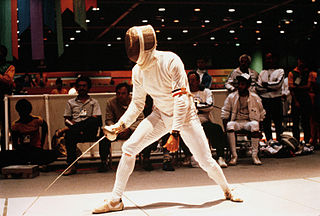
The men's épée was one of eight fencing events on the fencing at the 1984 Summer Olympics programme. It was the nineteenth appearance of the event. The competition was held from 7 to 8 August 1984. 63 fencers from 26 nations competed. Each nation was limited to 3 fencers. The event was won by Philippe Boisse of France, the nation's first victory in the men's individual épée since 1928 and fourth overall. France also took bronze, with Philippe Riboud winning the bronze medal match after losing to Boisse in the semifinals. It was Riboud's second consecutive bronze medal in the event, making him the 10th man to earn multiple medals in the individual épée. Silver went to Björne Väggö of Sweden. Hungary's four-Games podium streak in the event ended due to that nation joining the Soviet-led boycott.

The men's foil was one of eight fencing events on the fencing at the 1984 Summer Olympics programme. It was the nineteenth appearance of the event. The competition was held from 1 to 2 August 1984. 58 fencers from 26 nations competed. Nations had been limited to three fencers each since 1928. The event was won by Mauro Numa of Italy, the nation's sixth victory in the men's foil. His countryman Stefano Cerioni took bronze. The silver medal went to Matthias Behr, West Germany's first medal in the event and the first medal for any German athlete since 1928. France's five-Games podium streak ended.
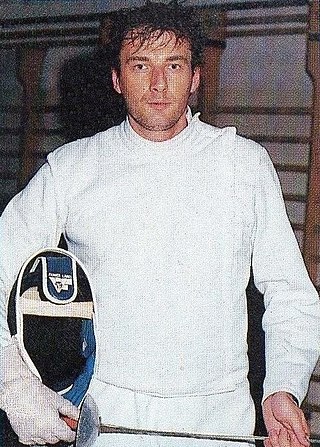
The men's sabre was one of eight fencing events on the fencing at the 1984 Summer Olympics programme. It was the twentieth appearance of the event. The competition was held from 3 to 4 August 1984. 33 fencers from 16 nations competed. Nations had been limited to three fencers each since 1928. The event was won by Jean-François Lamour of France, the nation's first victory in the event since 1900. Marco Marin of Italy took silver and Peter Westbrook of the United States took bronze. It was the first medal in the event in many Games for each of the three nations since 1964 for France, since 1960 for Italy, and since 1904 for the United States), as the men's sabre competitions had been dominated by Hungary and the Soviet Union. With both of those nations boycotting the 1984 Games, other nations had an opportunity to win medals in the sabre.
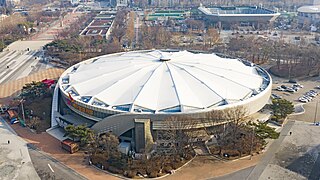
The men's épée was one of eight fencing events on the fencing at the 1988 Summer Olympics programme. It was the twentieth appearance of the event. The competition was held from 23 to 24 September 1988. 79 fencers from 33 nations competed. Each nation was limited to 3 fencers. The event was won by Arnd Schmitt of West Germany, the nation's second victory in the event. France's Philippe Riboud took silver, adding to his 1980 and 1984 bronze medals to become the third man to earn three medals in the individual épée. Andrey Shuvalov earned the Soviet Union's first medal in the event since 1968 with his bronze.

The men's sabre was one of eight fencing events on the fencing at the 1988 Summer Olympics programme. It was the twenty-first appearance of the event. The competition was held from 22 to 23 September 1988. 40 fencers from 18 nations competed. Nations had been limited to three fencers each since 1928. The event was won by defending champion Jean-François Lamour of France, the fourth man to successfully defend an Olympic title in the sabre and the 11th man overall to win multiple medals in the event. It was France's third victory in the event, matching the Soviet Union for second-most all-time. Janusz Olech took silver, Poland's first medal in the event since 1968. Italian Giovanni Scalzo earned bronze.

















